Henry's Crime Blu-ray Movie
HomeHenry's Crime Blu-ray Movie 
20th Century Fox | 2010 | 108 min | Rated R | Aug 23, 2011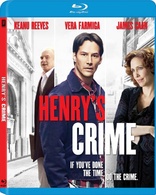
Movie rating
6.4 | / 10 |
Blu-ray rating
| Users | 0.0 | |
| Reviewer | 3.5 | |
| Overall | 3.5 |
Overview
Henry's Crime (2010)
Sleepwalking his way through life, Henry gets an unexpected wakeup call when he becomes an unwitting participant in a bank heist. Rather than give up the names of the real culprits, he takes the fall and discovers his true calling. Having done the time, Henry reasons he may as well do the crime. Discovering a forgotten tunnel connecting the bank to a nearby theater, he recruits his old cellmate Max to aid in the robbery, all the while playing the lead in the theatre's current production where he finds himself falling for his leading lady, Julie.
Starring: Keanu Reeves, Vera Farmiga, James Caan, Peter Stormare, Judy GreerDirector: Malcolm Venville
| Drama | Uncertain |
| Crime | Uncertain |
| Comedy | Uncertain |
Specifications
Video
Video codec: MPEG-4 AVC
Video resolution: 1080p
Aspect ratio: 2.40:1
Original aspect ratio: 2.39:1
Audio
English: DTS-HD Master Audio 5.1
Subtitles
English, Spanish
Discs
25GB Blu-ray Disc
Single disc (1 BD)
Playback
Region A (B, C untested)
Review
Rating summary
| Movie | 3.5 | |
| Video | 4.0 | |
| Audio | 3.5 | |
| Extras | 0.0 | |
| Overall | 3.5 |
Henry's Crime Blu-ray Movie Review
Shuffling Out of Buffalo
Reviewed by Michael Reuben September 22, 2011Henry's Crime is only nominally a crime story. Bank robbery drives the narrative, but one could just as accurately say that the film is about the theater (whose practitioners, in the Middle Ages, were considered little better than criminals). "All the world's a stage", according to Shakespeare, and the main characters of Henry's Crime are stuck in dead-end parts so dispensable that they feel like they can barely be seen. (Some of them may even prefer it that way.) The film is a shaggy dog story in which the titular crime becomes increasingly irrelevant, because it's primarily an opportunity for these people to rediscover and reinvent themselves (and each other) in ways they never expected.
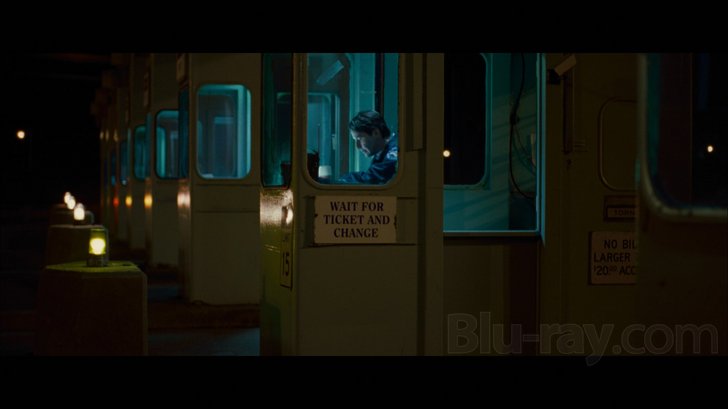
Henry Torne (Keanu Reeves) shambles through a life so dull that there should be nothing to tune out, but even this low-key existence seems more than Henry can bear. He works the night shift as a toll collector on the New York Thruway outside Buffalo, where the automated EZ-Pass system has so reduced the number of cash transactions that he rarely deals with a driver. He arrives home as his wife, Debbie (Judy Greer), is leaving for work, but has to avoid the one discussion Debbie wants to have, which is about starting a family. On this particular morning, Eddie (Fisher Stevens), whom Henry hasn't seen since high school, appears at the door accompanied by three other guys, all in baseball uniforms. One of them, Joe (Danny Hoch), is puking on the lawn from food poisoning. Eddie says their team is a man short. Could Henry fill in? The story is implausible, but Henry says yes. He goes along, even when Eddie asks him to wait in the car with the engine running while they pick up cash at a local bank's ATM. Henry doesn't flinch even when he notices the car has been hot-wired. But the bank's armed guard, Frank (actor and director Bill Duke), spots the set-up while he's out getting coffee, and Henry ends up being the only one busted for bank robbery. He refuses to give names and is sentenced to three years. As Henry later explains, this is his "way out". When Debbie tells Henry she's found someone else (skip the additional screenshots if you don't want to know who), he seems relieved. Besides, he's made a new friend: his cellmate, Max Saltzman (James Caan), a career inmate who finds prison life so congenial that he deliberately sabotages every parole hearing. This and a certain way with people has won him credibility with other inmates, and Max's good will protects Henry during his stay. Paroled after a year, Henry take Max's advice and picks a goal in life -- he decides to commit the crime for which he's already been convicted. Staring intently at the bank from the spot where he once sat in a stolen car, Henry steps into the street without looking and is almost run over by Julie (Vera Farmiga), a local theater actress. Frank, the bank guard who busted him, runs over and helps Henry into a café, where, on the men's room wall, Henry spots what becomes the key to his plan: a newspaper clipping from the 1920s, the era of prohibition, about the discovery of a bootlegger's tunnel between the bank vault and a speakeasy next door. Today, that building is a community theater, where Julie happens to be rehearsing a production of Chekhov's The Cherry Orchard. Now the stage has been set, but Harry needs another player, and he persuades Max not to "throw" his next parole hearing. With Max released -- the scene where Harry goes to pick him up at the prison gates is a perfect example of the kind of gentle comic digression that makes Henry's Crime worth watching -- the newly reunited roommates begin planning their caper. Casing the bank has to be done carefully, lest they arouse the suspicions of Frank the guard, who knows Henry. (Ultimately, they do catch Frank's attention, which leads to complications.) Casing the theater is even trickier, because Henry keeps encountering Julie, who intrigues him. It's not only her beauty, but the way she talks back to the imperious Russian director, Darek Millodragovic, hilariously played by Peter Stormare as a monstrous egomaniac. (You can practically hear him thinking, behind each thickly accented syllable, "Why am I, the great Millodragovic, stuck with these amateurs in this decadent capitalist backwater?") When the logistics of the robbery demand that Henry infiltrate the cast, taking over the part of Lopahkin previously played by Arnold (David Costabile), it's unclear whether Henry does it for the heist or to be close to Julie. Vera Farmiga is noted for the unpredictability of her acting choices (including her portrayal of a fundamentalist wife and mother in the current Higher Ground, which she also directed), and her Julie is no exception. Actresses playing actresses, especially in comedy, often go for egotism and self-absorption (think Annette Bening in Being Julia or Sally Field in Soapdish). Farmiga plays Julie as a regular person with a somewhat unusual job. She'd like greater success, better working conditions and a more tolerable boss, but whatever illusions she may have had about "the art" departed long ago. Still, part of acting is observing the behavior of others, and Julie is the one who notices that Henry, like her, tends to stand aside and watch. It's the quality that first attracts her curiosity -- and then, in spite of herself, more. Henry's Crime began as a story idea by Reeves's producing partner, Stephen Hamel, and was principally written by Sacha Gervasi, co-writer of Stephen Spielberg's The Terminal, with which it shares a similarly understated humor. The director was Malcolm Venville, who had previously demonstrated an ability to bring cinematic flair to actor-initiated projects while making the actors feel comfortable that the director was working for them. But on Venville's previous project, 44 Inch Chest, he'd was so deferential to the film's proponents and stars, Ray Winstone and Ian McShane, that he neglected to tell them their script was all character and no story. Gervasi's script for Henry's Crime is far superior, because it uses the bank robbery to sustain the narrative's forward motion, even as the plot takes bizarre turns into improbable romance and questionable employee practices (if you've seen it, you know what I mean). By the time Henry and Julie are standing before an opening night audience speaking lines that Chekhov never wrote (but might have, if he'd known these two), you may suddenly find yourself asking how the hell we got here, but each step makes perfect sense at the time.
Henry's Crime Blu-ray Movie, Video Quality 
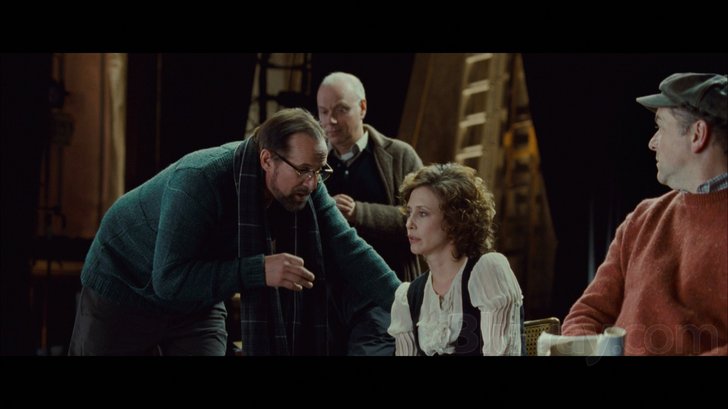
Although very little of Henry's Crime was shot on location in Buffalo, cinematographer Paul Cameron (Man on Fire, Deja Vu, Gone in 60 Seconds) seems to have taken great pains to replicate the look of that locale's wintry overcast climate, especially on skin deprived of sunlight. Flesh looks pale and, depending on the light, even sallow. The palette favors cool tones, notably blues; warmer tones such as reds tend to be desaturated. The image is detailed and fine-grained, and black levels are excellent; the latter is particularly important, because the film has many dark images and strong shadows, a notable example being the stroll that Henry and Julie take along Niagra Falls. I saw no compression artifacts, artificial sharpening or evidence of DNR or other filtering. This is an impressively film-like presentation, but those looking for "pop" and razor-edged sharpness should look elsewhere.
Henry's Crime Blu-ray Movie, Audio Quality 
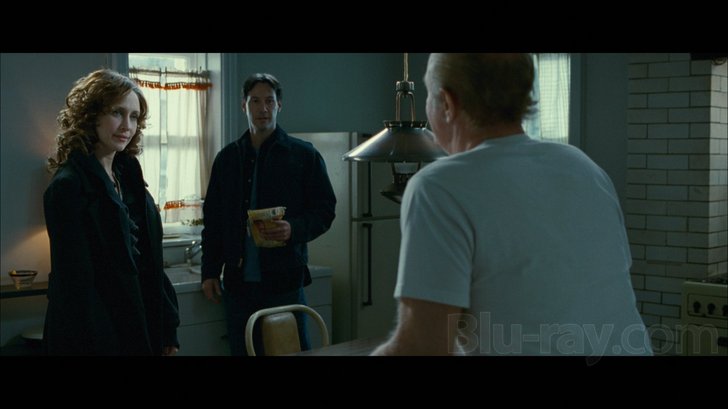
The film is largely dialogue-driven, but there are interesting moments for the 5.1 track, presented in DTS lossless, to expand the sonic presence: cars whizzing past Henry's toll booth, echoes in the theater, ambient sounds of environments such as the prison and the bank. The bulk of the musical score was supplied from the catalogue of Daptone records, featuring songs by Sharon Jones and the Dap-Kings, The Budos Band and The Menahan Street Band. It's distinctive, unusual and fits perfectly with the off-kilter soul of the picture.
Henry's Crime Blu-ray Movie, Special Features and Extras 
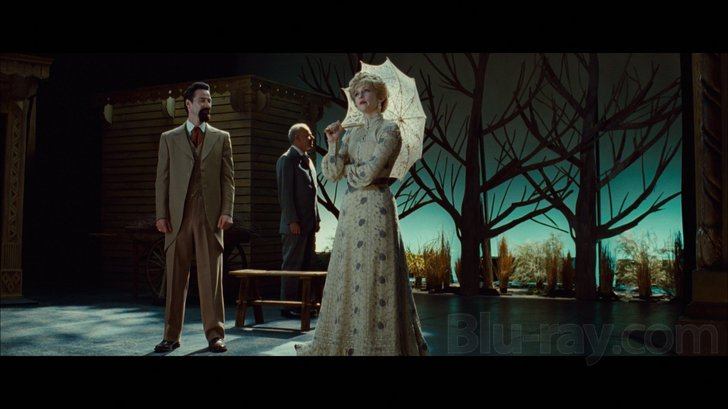
There are no extras listed on the disc. At startup, the disc plays trailers for Win Win, The 5th Quarter and Skateland in HD, and Breaking the Press and Terri in SD. These can be skipped with the chapter forward button and are not otherwise available once the disc loads.
Henry's Crime Blu-ray Movie, Overall Score and Recommendation 
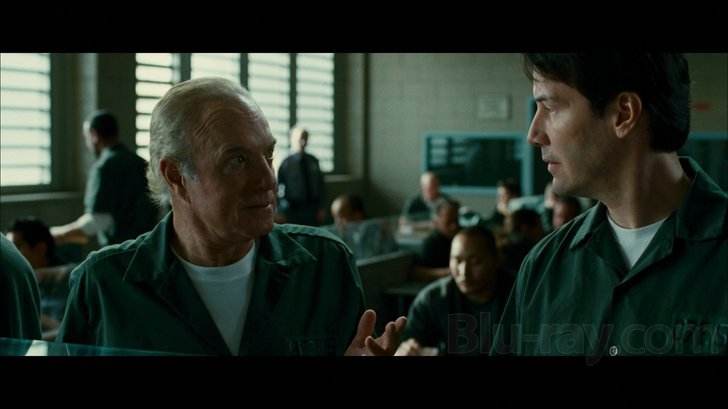
Henry's Crime is one of those films that actors love and marketers despise, for the same reason: It doesn't fit neatly into a genre category. The result, when the writing is good, is a story peopled by characters who have unexpected quirks and layers that make the actors' job interesting, and a product that PR people have no idea how to sell. Such films rarely receive more than limited theatrical distribution, and the best hope for top quality viewing is a well-mastered Blu-ray. I'm pleased to report that Henry's Crime received such treatment, with the only reservation being the lack of extras. Otherwise, both the film and the disc are highly recommended.
Similar titles
Similar titles you might also like

The Old Man & the Gun
2018

Son of a Gun
2014

The Informer
2019

Rob the Mob
2014

Papillon
2017

The Mustang
2019

Live by Night
2016

A Prayer Before Dawn
2017

Charlie Says
2018

Papillon
1973

Roman J. Israel, Esq.
2017

White Boy Rick
2018

Casino Jack
2010

Robot & Frank
2012

True Story
2015

Ain't Them Bodies Saints
2013

No Man of God
2021

Loving Pablo
2017

The Executioner's Song
1982

Devil's Knot
2013